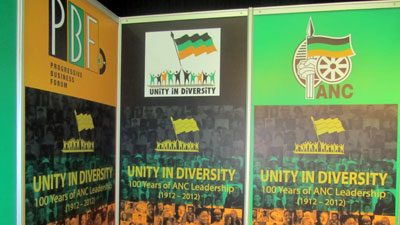Clear ideological trends on the character of the centenary ANC are emerging from its June 2012 National Policy Conference. It is an ideological hybrid. Its policy directions appear, in the first instance, as nationalist and racially corrective. Talk about nationalisation is contained and land redistribution is moderated and in terms of the discussion documents, subject to detailed processes.
This does not mean that references to ‘radical policy change’, the use of revolutionary phrases and official positioning in terms of the ongoing National Democratic Revolution (NDR), or as the ‘Second Transition’ in the form of ‘economic liberation’, do not abound. These remain and are likely to persist into the foreseeable future.
The ideological hybrid clearly emerged in the opening address of ANC and South African president, Jacob Zuma. They were clarified and confirmed in the extended media briefing by Zuma. It was convened to shed light on the ‘Second phase of the transition’, aka the ANC Youth League’s ‘economic liberation’. The latter was now appropriated by the ANC mother body, on its own terms … or was it?
Highly nationalist sentiments interspersed with references to ‘take the difficult decisions that were not possible in 1994’ (with reference to the 1993 constitutional settlement) stressed the ideological amalgam that the ‘new ANC’ has become. The allusions were that dramatic ideological shifts are waiting in the wings. The evidence of such a shift is still forthcoming.
It is also the second five-year cycle in a row in which the Zuma ANC is positioning itself as new and reconnecting with the people. These were central contentions in the Zuma ANC as it took over from Thabo Mbeki five years ago.
Zuma’s sets of arguments and utterances thus far show that there are few challenges – and certainly not in the Zuma inputs – to the capitalist and business order that prevails in South Africa. Rather, it is the continuing (white) racial character of dominant capital that draws the ire. De-racialisation as the alternative will ring in the further creation of patriotic capital – in the form of seeing black in general and black-African in particular assuming control of the commanding heights of the capitalist economy.
Quite a number of the Zuma utterances at these two major conference events focused on the poor, the fate of those that suffer continuous inequality, unemployment and poverty. The solutions on offer, though, still have to deal with the specifics of the conditions and how the ‘difficult decisions’ will extend into communities like those in throes of protest. Health, education, services in the form of improved housing, water or sewerage have earned fleeting references, but nothing so far to give specific hope of specific turnarounds. Small business and better opportunities have also had occasional references. But it is the nationalist de-racialisation project that has the status as pivot.
This selection of illustrations show the extent to which the president’s calls for ‘radical’ policy change are not that ‘radical’ … at best they are ‘drastic’. Radical in the true meaning of the concept refers to leftward change. The ANC may remain officially positioned as a ‘disciplined movement of the left, with bias towards to the poor and unemployed’, but Zuma’s ‘giant leap to socio-economic transformation’ appears not to move into much that can actually be denoted as ‘radical’.
There is a mismatch between the identification of the crux of South Africa’s problems 18 years into liberation – poverty, unemployment and inequality – and the specification of the giant leap, projected by the president in terms of deracialisation of business. These emphases, even if falling short of the need to address problems of the extraordinary ‘ordinary people’, do however largely match the ANCYL’s challenge on mines to the mother body. The essence of their proposals for the ‘nationalisation of the mines’ concerns the creation of patriotic capital.
It is in this context that many are arguing that the ANC should accept that it has become ‘merely’ a post-liberation, governing party. It has the responsibility to focus more clearly on the issues it faces in implementing seriously good policies. Without such systematic attention, these problems will continue into any new phase that is proclaimed. However, without these nationalist appeals and broad phrasing of limited initiatives, the regeneration of ANC power will slip right out of sight.
Susan Booysen is a Professor at the Wits Graduate School of Public & Development Management (P&DM) and author of The ANC and the Regeneration of Political Power
– By OPINION: Susan Booysen, Political Analyst


